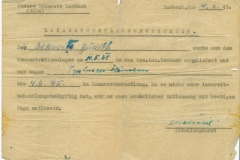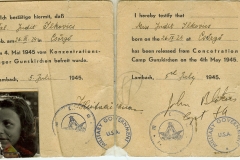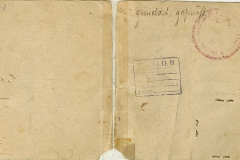"We walked towards the main road to meet the US Army. It was like a fairy tale: the endless column of Jeeps with the white stars, the cigarettes and goodies to us. They looked at us with pity and horror in their faces as if they were seeing ghosts and maybe they were."
— Judita Hruza, Letter to 71st Infantry on Liberation of GunskirchenThe U.S. Army liberated Gunskirchen on May 4, 1945, a day Judita called her second birthday. The SS guards were marching between bunks when explosions could be heard nearby. The guards ordered all prisoners into their barracks where rumors began to spread that the SS were leaving the camp. Some prisoners began celebrating while others lay motionless, gripped by fear. Judita could not imagine her future. She did not know how she would get home, who she would find there; she realized that she did not remember how to be happy. The prisoners began leaving the barracks and walking toward the unguarded gates to meet their liberators, the 71st Infantry of the U.S. Army. Dead bodies stiff in the crawling position littered the road; they died before making it out of the camp. As Judita approached the main road she saw U.S. Jeeps and soldiers waving “V” for victory. The soldiers threw cigarettes and candy to the ghostlike prisoners. Judita recalls picking up some candy and biting into her first Hershey bar. The sweet taste brought back long-forgotten images of her life before the war: life, love, safety, and freedom.
Judita had survived the war, but she was gravely ill with typhus. She was admitted to Lambach Hospital, a makeshift military hospital. For the first time in a long time she was treated with dignity and care, which gave her the strength and the will to live. After three weeks in the hospital she was released to a camp for displaced persons and waited for an organized transport home. She arrived back in Budapest, Hungary three months later in August 1945. When she returned she reunited with her brother, Denes, and learned that they were the only two members of their family who survived.
With no home, no property, and no means of living, Judita began tutoring students in English and Latin while her brother Denes worked as an electrician. They also received support from an American Jewish organization that provided shelter and food. One day Denes informed Judita that he had secretly enrolled her in medical school. Jews could now be admitted and there was no tuition.
In the summer of 1946 Judita and her brother learned that some surviving members of her father’s family were living in Czechoslovakia. The siblings left Hungary in October 1946 and Judita transferred to the Slovak University in Bratislava to finish her medical degree. Though the war was over, antisemitism was everywhere. Judita’s colleagues and professors tried to convince her to convert. Though her Slovak was poor, Judita used the hostility around her as motivation to study harder for her exams and she passed with excellent grades. In 1948 Judita qualified for transfer to Charles University Medical School in Prague, Czechoslovakia.



